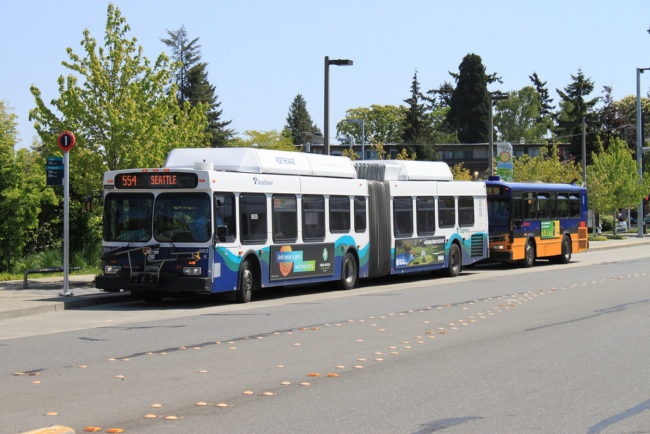Mercer Island sues Sound Transit, this time over buses
 ST Express 554 and King County Metro 204 buses at Mercer Island stop / photo by SounderBruce
ST Express 554 and King County Metro 204 buses at Mercer Island stop / photo by SounderBruceAs reported by the Mercer Island Reporter Thursday, the Mercer Island City Council is again preparing to sue Sound Transit.
In an open letter, the City Council contends:
It is essential for all Islanders to understand that the Bus/Rail Interchange, as currently proposed by Sound Transit, is in breach of the 2017 Settlement Agreement between Sound Transit and the City with the potential to adversely impact traffic patterns and public safety for all of our residents. We have notified Sound Transit numerous times that its current plan, which includes new curb cuts to accommodate bus layovers along North Mercer Way, fails to meet the terms of the Settlement Agreement which explicitly forbade these features. We have also voiced concerns over future operations that this plan enables, including the high volume of bicycles and pedestrians that will be expected to mix with cars and buses adjacent to the busy Park & Ride location once East Link light Rail is operational. Despite the City's reasonable objections and requests for essential information, Sound Transit has repeatedly ignored our concerns and insisted on unilaterally implementing its design plans.
However, the purported ban on curb cuts [They seem to be referring to bus pull-outs, not ADA wheelchair cuts in sidewalks at intersections.] along North Mercer Way is not in the settlement.
Sound Transit is expected to seek final construction permits for work around the station in September. The Mercer Island City Council is likely to oppose the permits unless the new lawsuit is settled. Delaying the permits could hold up the opening of East Link. But in order to delay the permits, the City would have to prove that Sound Transit has broken the terms of the settlement.
The City Council is pondering a utility tax increase to fund the costs of the lawsuit.
In 2017, STB covered the lawsuit by Mercer Island and the counter-suit by Sound Transit, as well as the settlement that allowed Sound Transit to proceed with station and track construction. The settlement removed from the table the bus-to-train / bus-to-bus transfer plan using 80th Ave SE, centered on rider convencience around the station, that ST and King County Metro had planned. It limited the number of buses allowed to serve the station to not exceed the number of buses serving Mercer Island Park & Ride at the time of the settlement, including specific peak-period limitations. It also banned scheduled layovers outside of PM peak hours. However, Metro was not a formal party to the settlement.
The inclusion of King County Metro in further talks is a point of contention, with the City wanting to go straight to mediation with just ST, and ST wanting Metro included in any further talks, since Metro, which operates all the public buses that would serve the station, would be the agency most impacted by any additional agreements. The apparent attempt to bypass Metro appears to go against Subsection 4.1 of the settlement:
The 2017 SEPA Addendum identifies two configurations for transit integration for when East Link is operational: (i) the 77th Avenue SE Configuration; and (ii) the goth Avenue SE Configuration. Pursuant to and as modified by this Agreement, the Parties agree to implement the 77th Avenue SE Configuration. To the extent that King County Metro buses are necessary to coordinate service, the Parties agree that the 77th Avenue SE Configuration cannot be implemented without King County Metros agreement. The Parties will work collaboratively with King County Metro to obtain its concurrence where necessary and document such concurrence as appropriate.
The peak-hour bus-volume limitations listed in the settlement could impact the termini of several Metro express routes slated to terminate outside of Seattle once East Link opens, including routes 111, 114, 212, 214, 216, 217, 218, and 219 (of which all but route 216 currently bypass Mercer Island P&R). The paths of all-day routes 204 and 554 could also be impacted, although the City saw fit to exempt local routes (now just route 204) from the limitations. Sound Transit Express bus 550 is slated to go away when East Link opens, which could allow some of these routes to start serving the station.
Some of these routes could also be forced not to serve the station due to the ban on layovers outside of PM peak. (See subsection 4.3 (b) of the settlement.) The reasoning for the ban on AM peak layovers seems pretty clear due to heavy peak Seattle-bound traffic. The reasoning for the off-peak ban is less clear.
Peak bus-volume limits could impact the viability of the Mercer Island to First Hill express route 630, since, as a route that serves more than Mercer Island, it is not excluded from the peak-hour bus traffic limit.
Update: The Mercer Island Communications Manager got back to me. He is not able to answer questions regarding the lawsuit, since it is pending litigation.